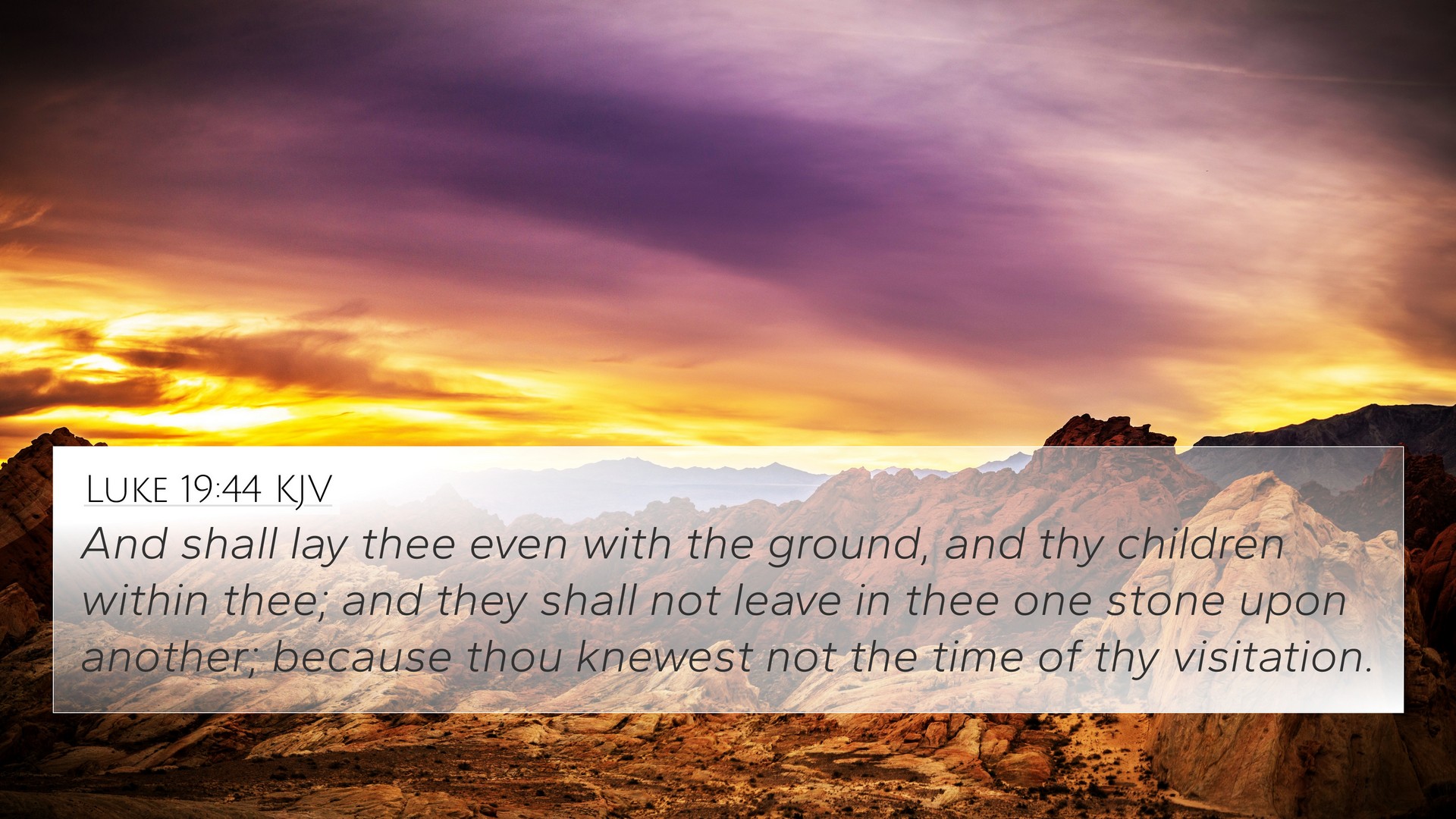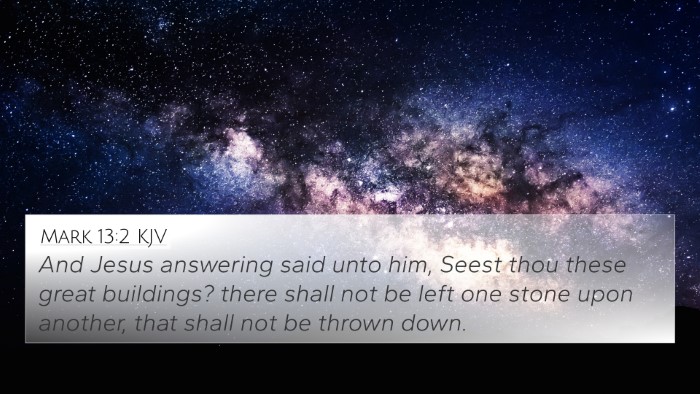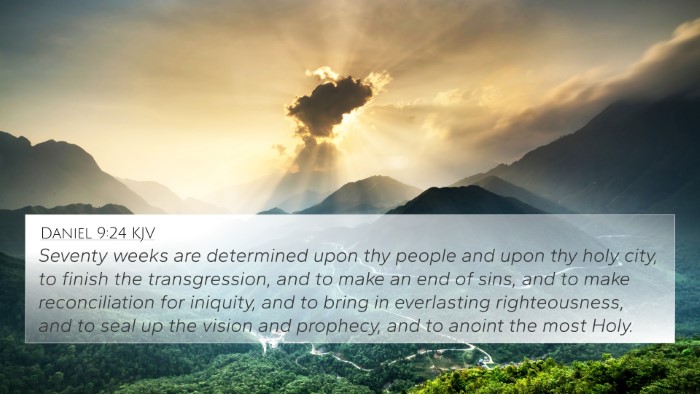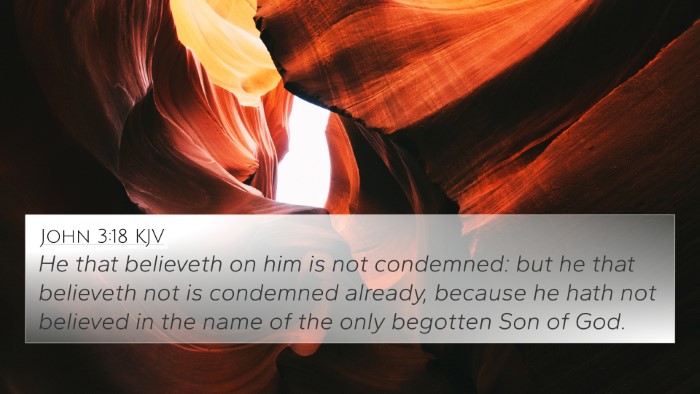Bible Verse Meaning: Luke 19:44
Luke 19:44 states: "And shall lay thee even with the ground, and shall lay thy children within thee, and they shall not leave in thee one stone upon another; because thou knewest not the time of thy visitation."
This verse is part of Jesus' lament over Jerusalem as He approaches the city. It signifies His deep sorrow and prophetic insight regarding the impending destruction of Jerusalem and its temple, which would occur primarily due to the city's rejection of Him as the Messiah.
Summary of Insights
The combined insights from prominent public domain commentaries provide a deeper understanding of this verse:
-
Matthew Henry: He emphasizes the gravity of Jerusalem's fate and how it stemmed from the people's failure to recognize the significance of Jesus' presence. The phrase "the time of thy visitation" indicates a period of divine opportunity, which the people neglected.
-
Albert Barnes: Barnes reflects on the prophetic nature of the statement, recognizing how it foretold the destruction that would come due to the people's refusal to heed the teachings of Christ. He connects the sorrow Jesus feels with the consequences of rejecting divine guidance.
-
Adam Clarke: Clarke delves into the metaphorical elements of the passage, stating that the destruction foretold speaks to both a physical and spiritual leveling of Jerusalem. He elaborates on the significance of "one stone upon another," indicating complete ruin as a result of disobedience.
Bible Cross-References
Understanding Luke 19:44 is enhanced by exploring its connections with other scriptures. Here are related Bible verses that deepen its meaning:
- Matthew 23:37-39: Jesus expresses His longing to gather the children of Jerusalem, lamenting over their rejection.
- Mark 13:1-2: Jesus predicts the destruction of the Temple, adding another layer to the message of Luke 19:44.
- John 1:11: "He came to His own, and His own did not receive Him," supporting the idea of rejection.
- Isaiah 29:1-2: A prophetic warning to Jerusalem, echoing the themes of destruction and sorrow.
- Jeremiah 52:12-14: Historical reference to the destruction of Jerusalem that correlates with Jesus' prediction.
- Luke 13:34: Similar to Matthew 23:37, this verse highlights Jesus’ lament over Jerusalem.
- Revelation 21:2: A vision of the new Jerusalem contrasts the fate of the old, emphasizing redemption after destruction.
- Romans 10:21: Discusses God’s desire for people to turn and be saved, paralleling His lamentation in Luke 19.
- Hebrews 10:28-31: Warns of judgments for rejecting God's revelation, tying into the consequences alluded to in Luke 19:44.
- Daniel 9:26: Prophecy regarding the anointed one and the destruction that would follow his rejection.
Interpretation and Analytical Study
This verse serves not only as a prediction of physical destruction but also as a stark reminder of the spiritual implications of turning away from divine truth. The lamentation illustrates Jesus’ profound compassion and desire for repentance among His people.
Understanding this passage invites readers to reflect on their own recognition of divine visitation in their lives. The rejection of Christ, as seen in Jerusalem, serves as a warning to believers today to remain vigilant and open to the workings of God.
Tools for Cross-Referencing Scriptures
For those wishing to delve deeper into cross-referencing biblical texts, several tools and methods can enhance their Bible study experience:
- Utilizing a Bible concordance for finding similar themes and meanings across verses.
- Engaging with a Bible cross-reference guide to explore relationships between Old and New Testament scriptures.
- Employing Bible reference resources that provide comprehensive listings of interconnected verses.
- Incorporating Bible chain references to create a thematic understanding of scriptural teachings.
- Accessing cross-reference materials specifically designed for sermon preparation and study.
Conclusion
Luke 19:44 encapsulates a pivotal moment in biblical history, one that challenges believers to consider the significance of responding to divine messages. The prophetic warning, combined with the loving lamentation of Jesus, serves as a call to awareness and repentance for all who read this scripture.
By exploring the connections between this verse and others, one can achieve a richer understanding of its themes and implications, underscoring the importance of staying attuned to God's guidance.

















